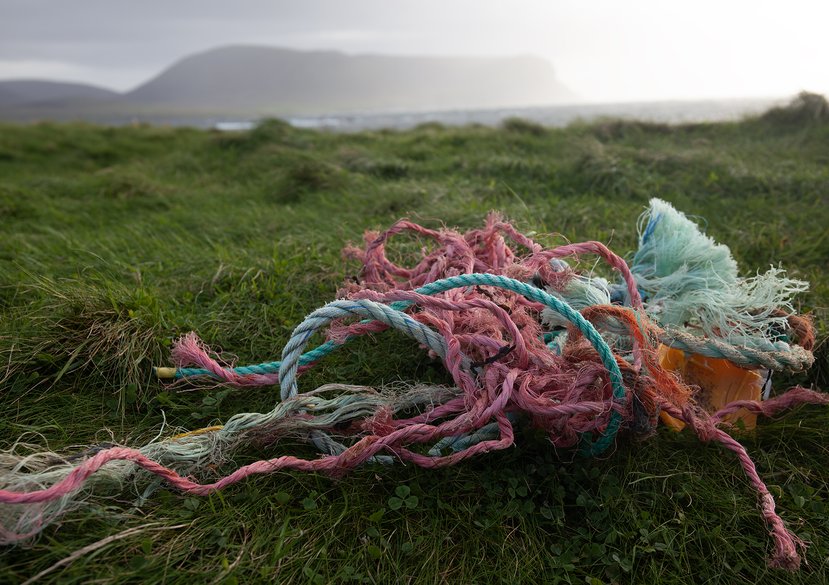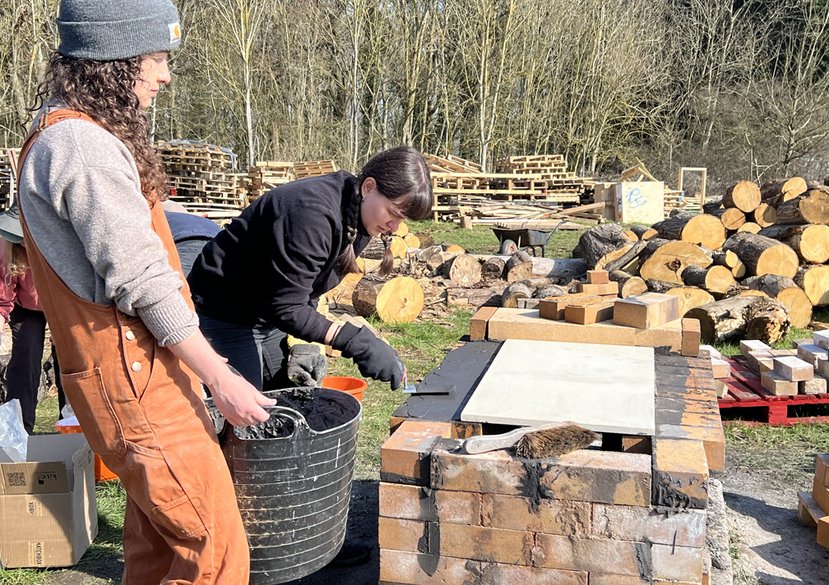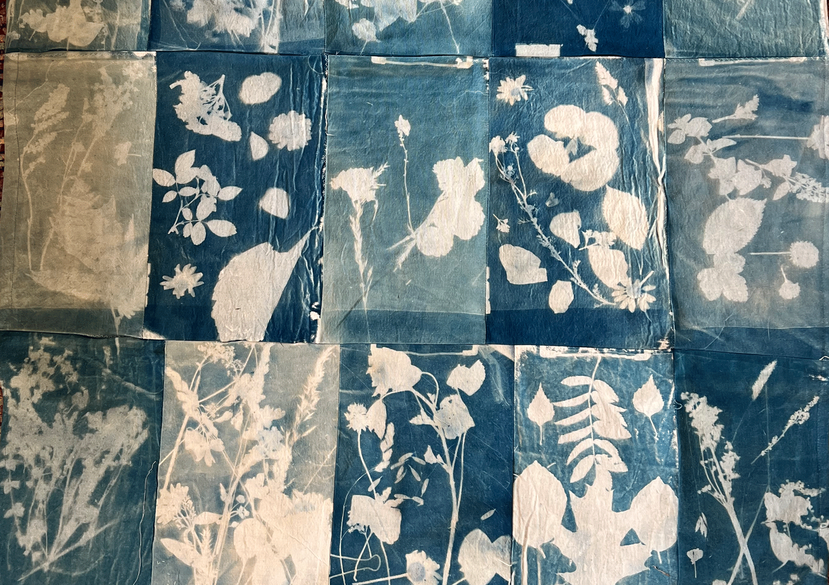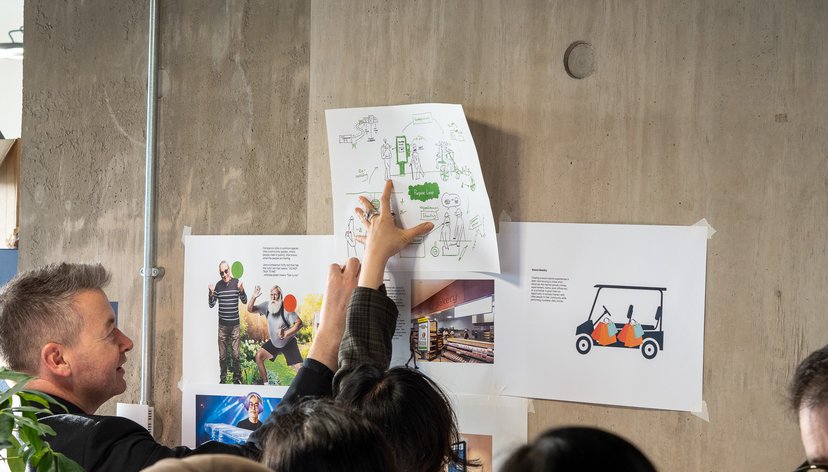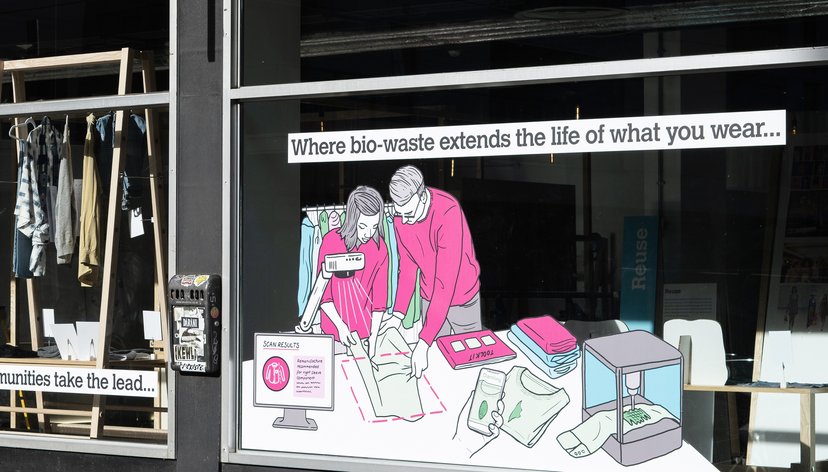Jump to
Since 2024, the Royal College of Art has awarded 15 impact fellowships so that RCA researchers can partner with organisations to benefit people and the planet.
These part-time fellowships are funded through the RCA’s AHRC Impact Acceleration Account (2022-27).
Fellowship projects apply RCA research to pressing issues in society, from community-led approaches to engaging with heritage, nature, and healthcare to practice-informed interventions into dementia care, carbon literacy, and marine plastics recycling. Through partnerships with councils, charities, and industry groups, new strategies, frameworks, and policies are being developed in dialogue with RCA researchers and practitioners. Enterprise Fellowships supported by InnovationRCA are enabling researchers to bring innovative design and leadership tools to market. Find out more about our Impact Fellows below.
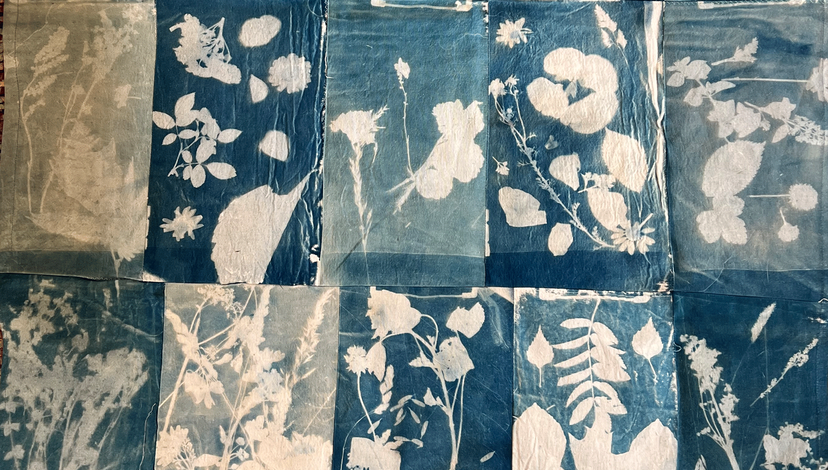
Making of a Meadow - cyanotype quilt, 2025. Made in collaboration with year 5 and 6 of Lady Joanna Thornhill Primary School
Gallery
-

The Ocean Orkney Chair: Recycling Marine Plastics with Local Communities
-

Carbon Literacy for Ceramic Kilns
-

Making of a Meadow
Fellowship projects
‘Carbon Literacy for Ceramic Kilns’, Peter Oakley (School of Arts & Humanities)
Community Fellowship, in collaboration with the Leach Pottery, MAKEsouthwest, and Oxford Kilns.
For this award the fellow will be collaborating with ceramic practitioners and senior managers affiliated to three leading UK craft ceramics charities: the Leach Pottery, MAKEsouthwest, and Oxford Kilns. The fellow will utilise the contextual, technical, and analytical knowledge they gained through working on two AHRC-funded projects, Sustainable Materials in the Creative Industries ( AH/V005510/1), and Carbon Measurement Tools in the Creative Industries (AH/X011313/1), as well as from Embedding Carbon Literacy in the Applied Arts, an engagement project funded through the RCA's AHRC Impact Acceleration Account (AH/X00337X/1). The aim is to improve the participants' carbon literacy by teaching them how to measure the carbon output of their ceramic firings, interpret the results, and utilise these findings in their strategic planning. The results and interpretation of the firing data, and its wider applicability for other ceramics practitioners, will also be disseminated through presentations, texts, and digital media to further broaden the project’s impact.
‘Ecological Citizen(s) Residency’, Robert Phillips (School of Design)
Policy Fellowship, in collaboration with Ealing Borough Council, Housing for Good, and Fortnum & Mason.
The Ecological Citizen(s) Residency fellowship: funds a ‘Designer in Residence’ in three locations beyond academia: primarily at Ealing Borough Council. The fellowship concerns three RCA/design-led spin outs (external to, but complimentary to the UKRI remit) from Ecological Citizen(s) Network+.
- Housing for Good, enables tenants to pay half rent and support local causes, creating a truly accessible (not just time rich) voluntary sector and citizen-led society. A new form of social / community innovation, built off 'Bona Vacantia' Government law.
- EC Saturday Jobs, opportunities for: residents, youth, aging society, disabled communities or more. Creating a new subsidised scalable employment opportunity.
- Ecological Citizen Employer / organisation, reviewing sustainable practices, supply chains and being a place-based EC.
The fellowships’ common thread deploys ‘Engaging Design’ methodologies and Ecological Citizenship. This embodies: Reach, Significance and Rigour with the intent of alignment to the RCA School of Design strategy (2024–27) under the topics of: sustainability, futures and citizenship and the possibility of being an Impact Case Study.
‘The Places We Go: Designing toilet policy with London’s local authorities’, Gail Ramster (Helen Hamlyn Centre for Design)
Community Fellowship, in collaboration with AgeUK London.
This project builds on Gail Ramster’s research (Engaged, Mayor of London / RCA, 2022-23) and that of AgeUK London to inform, exchange, capture and share knowledge on publicly accessible toilet approaches for local authorities.
The project will:
- run a one-day workshop to develop new Community Toilet Scheme guidance
- build on workshop findings through 4 x follow-on interviews to focus policy recommendations
- utilise impact pathways in local and regional government and develop those in national Government.
Through partnership with AgeUK London’s ‘London Loos’ campaign, the project has the network and opportunity for strong policy outputs with realistic routes to impact.
‘Design for Empowerment Leadership Toolkit’, Laura Santamaria (School of Communication)
Enterprise Fellowship, supported by InnovationRCA
The fellowship project's aim is to translate the Design for Empowerment principles and framework into a market-ready minimum viable product (MVP) – a pilot training programme and associated commercial strategy. The resource is targeted to sustainability leaders, consultants and DEI professionals seeking transformative approaches to leadership. Through targeted user engagement, co-design, testing and mentoring from InnovationRCA, the fellowship will develop a validated offer and value proposition, define clear routes to market (licensing, consultancy, or training delivery), and generate the conditions for enterprise uptake. The project bridges academic research and entrepreneurial application, creating scalable potential for real-world impact.
‘Communal Hormones - intercultural knowledge exchange and medical advocacy in Tower Hamlets through art’, Mijke van der Drift (School of Communication)
Community Fellowship, in collaboration with Queer Art Projects.
This project aims to facilitate borough-wide knowledge exchange on hormone replacement drugs in Tower Hamlets, addressing healthcare inequalities for marginalised communities. It will bring together trans femmes and women of colour to share experiences and advocate for better medical care. In partnership with Queer Art Projects, the initiative will host accessible workshops, culminating in a zine, performances, and a film screening. This initial phase will support a larger grant proposal to the Wellcome Trust, integrating medical science, the arts, and community engagement. Fellowship funding will enable workshops, events, documentation, and strategic planning to expand the project’s reach and impact.
‘Designing Dialogue: community-led learning’, Tracey Waller (School of Communication)
Community Fellowship, in collaboration with Islington Council and Healthy Generations.
This collaboration with Islington Council and Healthy Generations applies a critical pedagogical approach to engage older adults (56–65+) living on housing estates with historically low participation in the Council’s Active Space Programme. Grounded in dialogic and co-design methods, the project positions residents not as service users but as co-educators, drawing on their lived experiences to create communication tools that are contextually relevant and accessible. By reframing communication as a site of learning and exchange, the project challenges conventional top-down approaches. It fosters participatory knowledge production and collective agency, evaluating whether community-led design of both the council’s activities and their communication can lead to deeper, more sustained participation in Active Space Programme through provider Healthy Generations. With a long term aim to improve wellbeing.
'Developing a Sensory Design Tool for Everyday Environments', Katie Gaudion (Helen Hamlyn Centre for Design)
Enterprise fellowship, in collaboration with Autism at Kingwood and supported by InnovationRCA.
An estimated 15-20% of the global population is neurodivergent (Doyle, 2020), and sensory sensitivities can significantly impact their experiences. However, these sensitivities are often invisible and difficult to anticipate, leading to their frequent oversight in design. This project builds on the 'What do you like? sensory preference cards' (Gaudion & Brand, 2012 PDF), originally created to help autistic adults with intellectual disabilities communicate their sensory preferences. While effective in home settings, the cards are difficult to share and store. The project seeks to expand their use, making them more versatile and accessible in spaces like dental surgeries, schools, and public areas.
'Language and Landscape: Making of a Meadow', Jessica Potter (School of Arts & Humanities)
Community fellowship, in collaboration with the Kent Downs National Landscape.
Language and Landscape Impact fellowship builds on the research project 'Making of a Meadow' to engage publics in accessing and attending to bio and geo diverse habitats. Making of a Meadow is a workshop series that shares artists and ecologists work sensing and articulating biodiverse habitats through attentive methodologies. This work supports the Kent Downs National Landscapes' current application to realise UNESCO cross border Geopark status. Making of a Meadow celebrates cultural and geological characteristics of the UK and reaches out beyond the borders of the UK towards Northern France through our shared chalk geology.
'Heritage of conflict "in and about" Northern Ireland: new audiences and public participation', Louise Purbrick (School of Arts & Humanities)
Community fellowship, in collaboration with Healing Through Remembering.
Two projects, 'Everyday Objects Transformed by the Conflict' and the Heritage of Maze Long Kesh, will be undertaken with cross-community conflict-resolution organisation Healing Through Remembering to engage and involve communities neglected or ignored in peace-building processes ‘in and about’ Northern Ireland.
'Making With: sharing and amplifying Clay for Dementia workshops', Katie Spragg (School of Arts & Humanities)
Community fellowship, in collaboration with the Garden Museum.
This fellowship will record, evidence and reflect upon the impact of and beyond the Clay for Dementia workshops that Katie Spragg has facilitated at the Garden Museum for people with dementia and their companions (partners, family members, carers, friends) since 2017. Her research builds on understanding how arts activities are beneficial for people with dementia. She has observed that clay’s inherent material qualities have the potential to facilitate non-verbal communication and storytelling, enabling people with dementia to access embodied knowing and memory.
This impact project will develop new modes of co-creating collaborative outcomes to improve well-being and share the experiences and knowledge of people with dementia and their families. It seeks to expand the public’s perspective of people with dementia by giving an insight into what Spragg observes when making with them, which includes moments of collective joy, a sense of hopefulness and creativity.
Through the impact fellowship, Spragg, participants and volunteers will co-create a publication; an anthology of what Clay for Dementia does and means for those involved. This, alongside sharing events and networking, will allow them to share the model of the workshops and the potential of this type of programme with other heritage institutions and for advocacy and policy development in dementia facing services. Findings from this fellowship will provide the basis to develop a new programme of similar workshops in Brighton or the South Coast.
'Nature, Health and Community through Design', Qian Sun (School of Design)
Community fellowship, in collaboration with MindKind Projects CIC.
Building on two AHRC-funded research projects ('Nature’s Way: Co-Creating Methods for Innovating Nature-based Solutions for Public Health and Green Recovery in a Post-COVID World' and 'Connecting Roots: Co-creating a Green Social Prescribing Network in Walsall for Health and Wellbeing'), this fellowship aims to support Voluntary, Community and Social Enterprises, social housing groups, large charities, and local councils, to develop engagement activities with the communities they serve in the Black Country. This supports the evaluation and scaling of the impact that the research projects have already achieved.
'The Orkney Ocean Chair - Recycling Marine Plastics with Local Communities', Katharina Vones (School of Arts & Humanities)
Community fellowship, in collaboration with Tern360.
The fellowship will allow me to conduct a range of impact activities over seven months in conjunction with the Orkney-based community organisation Tern360, exploring the potential of recycling marine plastics alongside local communities. The proposal has two strands: (1) running a series of marine plastics workshops in local primary schools on Orkney, and (2) the production of a prototype ‘Orkney Ocean Chair’, incorporating ocean plastic, in collaboration with local craft practitioners. The aim is to heighten awareness of, and change attitudes, perceptions and actions relating to, the potential of using marine plastics as a viable resource for diverse making practices.
'The Creative R&D Matrix', Dawn Ellams (School of Design)
Policy fellowship, in collaboration with UKFT (UK Fashion & Textile Association).
The Creative R&D Matrix: Evidencing activities from 'Future Fashion Factory' cross-discipline and -sector collaborations to expand understanding and remove barriers to Research & Development activities within Fashion and Textiles. UKFT have recognised that R&D is a crucial activity for the fashion and textiles sector in meeting sustainability targets and that there is an urgent need to remove barriers to R&D funding in the UK. This fellowship will work with UKFT to communicate research from the AHRC Creative Clusters Programme project ‘Future Fashion Factory’ to evidence a range of R&D activities across fashion and textile supply chains, aiming to support expanding understanding of R&D activities within the sector beyond traditional applied scientific methods.
'Art and Urban Regeneration', Jaspar Joseph-Lester (School of Arts & Humanities)
Policy fellowship, in collaboration with Wandsworth Council.
This project takes up the question of art’s role in prefiguring the city to propose new approaches to art and expanded roles for artists within areas undergoing urban regeneration. Working closely with Wandsworth Council, I will explore the potential for new encounters, structures and platforms to enable the cultural prefiguring of urban space. The Fellowship will lead to a photo essay that - through documenting and reflecting on the group walks and workshops – will make recommendations for developments in policy. The Fellowship will also function as an example of how artists can be deployed at the earliest possible stage of urban development for the benefit of urban stakeholders.
'Sonic Justice', Matt Lewis (School of Communication)
Policy fellowship, in collaboration with Arts Education Exchange.
Sonic Justice is an approach to developing community cohesion and governance through listening convened by Dr Matt Lewis and Dr Cecilia Wee. The work has been hosted by Arts Education Exchange (AEE) a charity based in Margate, who support marginalised young people through arts education. The project has allowed AEE staff and a range of local organisations and individuals to come together to explore new modes of working together through sound. Organisations involved include People Dem Collective, Open School East, GRASS, Bon Volks, Resort Studios, Margate Radio, Arts In Ramsgate, Margate Community Land Trust, and Thanet District Council. The work has allowed participants to explore the energies offered by alternative ways of communicating and coming together as a means to question existing models of governance and organisation.
